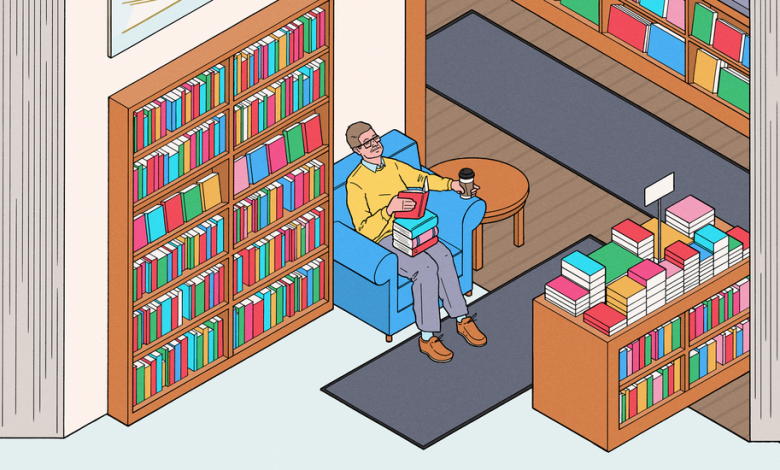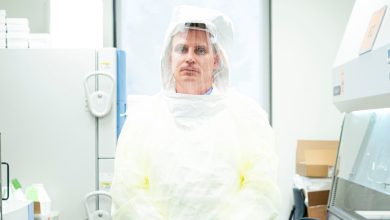In Praise of Bookstores, a Reader’s Refuge

More from our inbox:
- The Kafka Diaries
- News Literacy: The Antidote for Online Misinformation
- Misdiagnosed by an Apple Watch
- Unrepresentative Polls

Credit…Kyle Ellingson
To the Editor:
Re “The Unlikely Bookstore of My Dreams,” by Ezra Klein (column, Jan. 30):
I second Mr. Klein’s praise for his — and my — lifelong refuge: the bookstore, especially Barnes & Noble, whose survival was one of the few truly good things to come out of the pandemic.
Yes, Amazon carries everything and at lower prices, but there has always been something special about being inside a bookstore — be it a Barnes & Noble or an independent store — and taking time to browse the shelves in different departments and hold the books in my hands.
Sometimes I’m in the mood to look at every book in the history section; other times it’s baseball or photography or biography. Once in a while, I’ll spot a classic novel I’ve avoided for decades and give it a try.
I confess that I have taken a book off a bookstore’s shelf and spent hours in the store reading it from start to finish. Why? As Mr. Klein wrote, what makes a bookstore great is that it’s a place not just to buy books, “but to be among them.”
And all those books on the half-dozen bookshelves at my home serve as continual reminders to me of all the things that have piqued my interest over the years.
Fred T. Rossi
Scotch Plains, N.J.
To the Editor:
I just finished reading Ezra Klein’s earnest effort to nominate Barnes & Noble for sainthood. Doesn’t he know about Barnes & Noble’s history of devouring small, independent bookstores, that the chain was once the bane of all independent bookstores? (The movie “You’ve Got Mail” was about such predatory behavior.)
I was the manager of the old and rare books department at a Shakespeare & Company bookstore on the Upper West Side in Manhattan when Barnes & Noble appeared in our neighborhood like a hungry Tyrannosaurus, devouring our store and a couple of others, like the much treasured children’s bookstore Eeyore’s.
I completely share Mr. Klein’s love of brick-and-mortar bookstores (I once owned one myself), but a little bit of corporate and community history would be appreciated.
Mike Feder
New York
To the Editor:
Kudos to Ezra Klein for the good news celebrating physical books and bookstores and explaining the resurgence of Barnes & Noble.
During the pandemic some of the independents offered author interviews on Zoom — a real gift to the homebound. We logged on to Powell’s City of Books in Portland, Ore., and met wonderful books unknown to us and had the pleasure of watching an hourlong interview with the authors.
Yes, we pay more for our books at the brick-and-mortar bookstores, but there are many benefits not available from online sources. Long live bookstores!
Barbara Sentovich
Los Alamitos, Calif.
The Kafka Diaries
To the Editor:
Ross Benjamin happily places himself on the right side of history in “The Search for the Real Franz Kafka Continues” (Opinion guest essay, Feb. 5). As grateful as I am to Mr. Benjamin for his recent completist translation of Kafka’s diaries, I don’t think it’s necessary to trash Max Brod, Kafka’s friend and literary executor, for his less complete version.
Mr. Benjamin is anachronistic when he positions Brod as someone who does wrong by Kafka in cleaning up and vetting the Kafka diaries. Today we revere error, fragmentation and queerness. But when Brod published the diaries, he was embarking on a project at a time that none of these qualities were valued, and publishing any of it was against his great friend’s wishes, so Brod took cautious yet important steps toward a reveal of Kafka.
Try to imagine publishing your best friend’s very personal diaries, unedited, against their wishes many years after their death. I would suggest that what Brod did was just enough, indeed perfect for the moment, and that we see Mr. Benjamin’s new fuller translation as following in Brod’s great footsteps.
Rather than take Brod down, we should be on our knees to him for his courage and insight, and thank him for what he has given us.
Annie-B Parson
Brooklyn
News Literacy: The Antidote for Online Misinformation
To the Editor:
Re “A Ban on TikTok Won’t Make Us More Secure,” by Glenn S. Gerstell (Opinion guest essay, Feb. 4):
Privacy legislation is, indeed, a key part of a larger solution to helping our laws catch up to the realities of our digital world — and to preventing foreign adversaries from using our data against us.
But we also need to help Americans learn how to navigate our online world and become less susceptible to manipulation. Otherwise, the threats that Mr. Gerstell so aptly described will remain.
Luckily, there is another promising solution: We can ensure that more Americans are news literate.
News literacy teaches you to identify credible sources and separate fact from fiction. Evidence increasingly shows that this approach can help “inoculate” people against being manipulated by misinformation. Just look to Finland, which requires media literacy instruction starting in preschool. Its citizens are the most resistant to misinformation of all Europeans surveyed, as you reported on Jan. 11 (“How Finland Teaches Even Youngest Pupils to Spot Misinformation”).
We need a concerted effort from state and local governments to make news literacy instruction a reality for all Americans. Let’s demand media literacy instruction in schools and protect ourselves from misleading claims that spread online.
Ebonee Rice
Washington
The writer is senior vice president, educator engagement, for the News Literacy Project.
Misdiagnosed by an Apple Watch
To the Editor:
Re “911 Gets a Call; It’s Your Watch, and It’s Worried” (front page, Feb. 4):
False-positive alerts from Apple Watch’s health features are not new. In 2020, I co-wrote a peer-reviewed research study that discovered that many alerts from Apple Watch’s abnormal heart rhythm detection feature were false positives.
We observed that for every seven patients who went to a health care setting with an alert, only one was diagnosed with clinically actionable cardiovascular disease. These erroneous alerts lead to the overuse of health care resources.
Apple and other technology companies must carefully consider unintended consequences of false-positive alerts when they develop health-focused features, lest their products turn into the algorithm that cried wolf.
Kirk D. Wyatt
Fargo, N.D.
The writer is a pediatric hematologist and oncologist.
Unrepresentative Polls
To the Editor:
Re “Is Trump Way Up or Way Down?” (The Upshot, nytimes.com, Feb. 3):
Pollsters seem to want to ignore the simple fact that it is impossible to have a representative sample when people increasingly do not respond to pollsters. Pollsters argue that they use statistical tools to correct for unrepresentative samples, but their obvious failures in recent elections belie this.
Pollsters and the media, including The New York Times, have a vested interest in polling, but given all the poor polling it’s hard to argue that it offers significant benefits. Polling is more speculative than news and should be treated as such.
Douglas Renfield-Miller
Redding, Conn.




